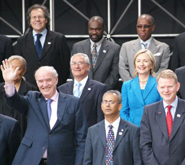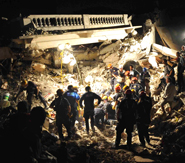AS/COA Online | LatAm in Focus: What to Watch in NAFTA Negotiations
/Within days of the first round of North American Free Trade Agreement renegotiations in August, President Donald Trump was once again threatening to withdraw the United States from the 23-year-old pact. But, aside from comments at a rally or some Sunday-morning tweets, can the president actually do that?
Gary Hufbauer, a senior fellow at the Peterson Institute for International Economics, argues that, yes, he can—and that’s what he might do if his administration can’t secure the kinds of concessions he needs from Mexico and Canada to claim a political win. Leaving the deal, a move only 6 percent of Americans support, would come at a cost, though. “There will be a huge backlash if he terminates, both by the business community, which is benefiting, and workers who will discover that they were benefiting from NAFTA,” Hufbauer told AS/COA Online Editor-in-Chief Carin Zissis.
Still, Hufbauer suggests there is a good likelihood that the three countries will “muddle through” the talks, making minor concessions that might not leave any of the three parties satisfied but giving the appearance of a political win for all. One reason it will be hard to do much more is that both Mexico and the United States hold elections next year, meaning the talks can’t go much past January. “This notion of this five-month quickie is pretty optimistic,” said Hufbauer, who adds there’s a chance that provisional agreements will be made this year and then new rounds will commence in 2019, after elections conclude.
“There will be a huge backlash if [Trump] terminates.”
Setting aside political wrangling, negotiators will have to sit down and work out the technical details. Given that the United States will likely be looking for changes reflecting a “Buy American” protectionist streak, Mexico could find itself facing tough decisions over how to handle U.S. demands to trim a $64 billion trade deficit.
Hufbauer outlines what Mexico’s steps might be as the country prepares to host the second round of talks from September 1 to 5.
This podcast was produced by Luisa Leme.




